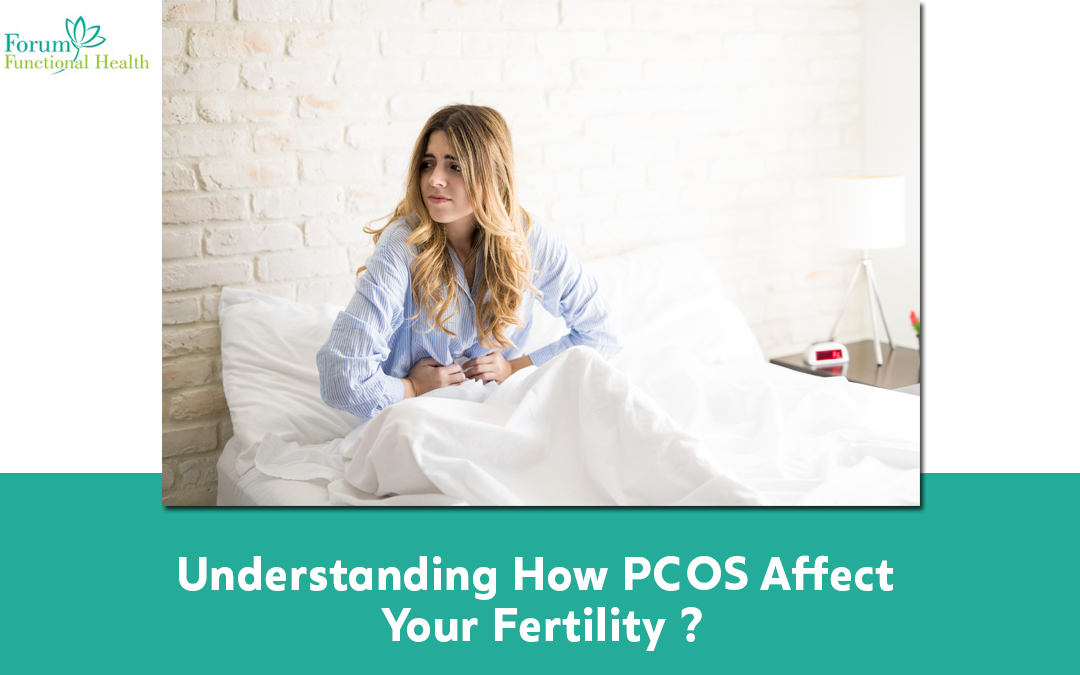Understanding How PCOS Affect Your Fertility

[et_pb_section fb_built=”1″ admin_label=”section” _builder_version=”3.0.47″][et_pb_row admin_label=”row” _builder_version=”3.0.47″ background_size=”initial” background_position=”top_left” background_repeat=”repeat”][et_pb_column type=”4_4″ _builder_version=”3.0.47″ parallax=”off” parallax_method=”on”][et_pb_text admin_label=”Text” _builder_version=”3.0.47″ background_size=”initial” background_position=”top_left” background_repeat=”repeat”]
Polycystic Ovary Syndrome (PCOS) is a common hormonal disorder affecting women of reproductive age, with significant implications for fertility. If you’re navigating PCOS and its impact on your ability to conceive, it’s essential to understand how this condition affects fertility and explore strategies to overcome these challenges.
PCOS and Fertility: Unravelling the Connection
PCOS disrupts the hormonal balance in the body, leading to irregular menstrual cycles and ovulation. Typically, during a menstrual cycle, an egg is released from the ovaries (ovulation), allowing for the possibility of conception. However, in women with PCOS, hormonal imbalances can inhibit ovulation or cause irregular ovulation, making it difficult to predict fertile days and conceive naturally.
High levels of androgens (male hormones) in women with PCOS can also interfere with the development and release of eggs from the ovaries. Additionally, insulin resistance, a common feature of PCOS, can further exacerbate hormonal imbalances and disrupt ovulation, contributing to fertility issues.
Understanding these underlying mechanisms is crucial for individuals with PCOS and their healthcare providers to develop effective strategies for improving fertility outcomes.
Strategies for Enhancing Fertility with PCOS
While PCOS can present challenges for fertility, there are several strategies that individuals can employ to enhance their chances of conceiving:
Maintain a Healthy Lifestyle: Adopting a healthy lifestyle that includes a balanced diet, regular exercise, and stress management techniques can help regulate hormonal imbalances associated with PCOS. Focus on consuming nutrient-rich foods, such as fruits, vegetables, whole grains, and lean proteins, and avoid processed foods and excessive sugars.
Monitor Your Menstrual Cycle: Tracking your menstrual cycle can provide valuable insights into your fertility patterns and help identify potential ovulation issues. There are various apps and tools available to help you monitor your cycle and predict fertile days, allowing for targeted attempts at conception.
Consider Natural Supplements: Some natural supplements, such as myo-inositol, omega-3 fatty acids, and N-acetylcysteine (NAC), have been shown to improve menstrual regularity and ovulation in women with PCOS. Discussing these options with your healthcare provider can help determine if they may be beneficial for you.
Seek Supportive Care: Working with a healthcare provider who specializes in reproductive health and fertility can provide valuable support and guidance throughout your fertility journey. They can offer personalized treatment recommendations tailored to your individual needs and help monitor your progress over time.
Explore Fertility Treatments: In cases where natural approaches are insufficient, fertility treatments such as ovulation induction with medications, intrauterine insemination (IUI), or in vitro fertilization (IVF) may be considered. These options can help overcome ovulation issues associated with PCOS and increase the likelihood of conception.
Empowering Yourself through Knowledge and Support
Navigating fertility challenges with PCOS can be daunting, but it’s essential to remember that you’re not alone. Seeking support from healthcare professionals, support groups, or online communities can provide valuable insights, encouragement, and practical tips for managing PCOS and improving fertility outcomes.
At the same time, educating yourself about PCOS and its impact on fertility empowers you to take an active role in your reproductive health. By understanding the underlying mechanisms of PCOS-related infertility and exploring various strategies for enhancing fertility, you can make informed decisions and take proactive steps towards achieving your family planning goals.
Natural Treatment Approaches for PCOS and Fertility
Fortunately, there are natural treatment approaches that can help manage PCOS and improve fertility outcomes:
Healthy Diet: Adopting a balanced diet rich in whole foods, fruits, vegetables, and lean proteins can help regulate insulin levels and improve hormone balance. Avoiding processed foods, refined sugars, and excessive carbohydrates is essential in managing insulin resistance commonly associated with PCOS.
Regular Exercise: Engaging in regular physical activity, such as walking, swimming, or yoga, can help improve insulin sensitivity and promote weight loss, which may in turn improve fertility outcomes for women with PCOS.
Stress Management: Chronic stress can exacerbate hormonal imbalances and disrupt ovulation. Practicing stress-reducing techniques such as meditation, deep breathing exercises, or mindfulness can help alleviate stress and support hormonal balance.
Herbal Supplements: Certain herbal supplements, such as chasteberry (Vitex agnus-castus) and cinnamon, have been shown to help regulate menstrual cycles and improve fertility in women with PCOS. However, it’s essential to consult with a healthcare provider before starting any herbal supplement regimen.
Acupuncture: Acupuncture, an ancient Chinese healing practice, has shown promise in improving ovulation and menstrual regularity in women with PCOS. It works by stimulating specific points on the body to promote hormonal balance and regulate menstrual cycles.
Seek Professional Care
At Forum Functional Health Center, we take a comprehensive and holistic approach to managing PCOS and promoting fertility. Our team of experienced healthcare practitioners understands the complexities of PCOS and tailors treatment plans to address each individual’s unique needs.
Through personalized dietary counseling, lifestyle modifications, and natural therapies, we aim to regulate hormonal imbalances, improve insulin sensitivity, and enhance overall reproductive health. Our approach emphasizes empowering individuals with PCOS to take charge of their health and well-being through sustainable lifestyle changes.
Additionally, our integrative approach may include collaborative care with other healthcare providers, such as reproductive endocrinologists or fertility specialists, to ensure comprehensive and coordinated management of PCOS-related fertility issues.
[/et_pb_text][/et_pb_column][/et_pb_row][/et_pb_section]
